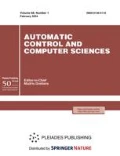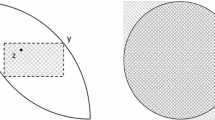Abstract
A confidence interval is a range of values that gives the user a sense of how precisely a statistic estimates a parameter. In the present paper, a new simple computational method is proposed for simultaneous constructing and comparing confidence intervals of shortest length and equal tails in order to make efficient decisions under parametric uncertainty. This method represents a simple and computationally attractive numerical technique for finding the shortest-length and equal tails confidence intervals using pivotal quantities, which are developed from either maximum likelihood estimates or sufficient statistics. In statistics, a pivotal quantity (or pivot) is a function of observations and unobservable parameters such that the function’s probability distribution does not depend on the unknown parameters (including nuisance parameters). Finding a pivotal quantity is not discussed, but the choice a “good” pivotal quantity is essential for the resulting confidence interval to be useful. The unified computational technique yields intervals in several situations which have previously required separate analyses using more advanced techniques and tables for numerical solutions. Unlike the Bayesian approach, the proposed approach is independent of the choice of priors and represents a novelty in the theory of statistical decisions. It allows one to eliminate nuisance parameters from the problem via the technique of invariant statistical embedding and averaging in terms of pivotal quantities (ISE&APQ). It should be noted that the well-known classical approach to constructing confidence intervals of the shortest length considers at least three versions of possible solutions and is in need of information about the form of the probability distribution of pivotal quantity in order to determine an adequate version of the correct solution. The proposed method does not need such information. It receives this information through the quantiles of the probability distribution of pivotal quantity. Therefore, the proposed method automatically recognizes an adequate version of the correct solution. To illustrate this method, numerical examples are given. In detail, the Pareto distribution is discussed.
Similar content being viewed by others
REFERENCES
Juola, R.C., More on shortest confidence intervals, Am. Stat., 1993, vol. 47, pp. 117–119.
Nechval, K.N., Nechval, N.A., Vasermanis, E.K., and Makeev, V.Y., Constructing shortest-length confidence intervals, Transp. Telecommun., 2002, vol. 3, pp. 95–103.
Ferentinos, K.K. and Karakostas, K.X., More on shortest and equal tails confidence intervals, Commun. Stat. – Theory Methods, 2006, vol. 35, pp. 821–829.
Excel 2010—Computer Software “Solver.”
Tate, R.F. and Klett, G.W., Optimum confidence intervals for the variance of a normal distribution, J. Am. Stat. Assoc., 1959, vol. 54, pp. 674–682.
Nechval, N.A., Nechval, K.N., Prisyazhnyuk, S.P., and Strelchonok, V.F., Tolerance limits on order statistics in future samples coming from the Pareto distribution, Autom. Control Comput. Sci., 2016, vol. 50, no. 6, pp. 423–431.
Nechval, N.A., Berzins, G., Purgailis, M., and Nechval, K.N., Improved estimation of state of stochastic systems via invariant embedding technique, WSEAS Trans. Math., 2008, vol. 7, pp. 141–159.
Nechval, N.A., Nechval, K.N., Danovich V., and Liepins, T., Optimization of new-sample and within-sample prediction intervals for order statistics, Proceedings of the 2011 World Congress in Computer Science, Computer Engineering, and Applied Computing, WORLDCOMP'11, 2011, Las Vegas, pp. 91–97.
Nechval, N.A., Berzins, G., and Danovics, V., Optimization of statistical decisions for age replacement problems via a new pivotal quantity averaging approach, Am. J. Theor. Appl. Stat., 2016, vol. 5, pp. 21–28.
Nechval, N.A., Berzins, G., Balina, S., Steinbuka, I., and Nechval, K.N., Constructing unbiased prediction limits on future outcomes under parametric uncertainty of underlying models via pivotal quantity averaging approach, Autom. Control Comput. Sci., 2017, vol. 51, no. 5, pp. 331–346.
Nechval, N.A., Berzins, G., and Nechval, K.N., Intelligent planning reliability-based inspections of fatigued structures for the crack initiation period in the Weibull case under parametric uncertainty, Autom. Control Comput. Sci., 2018, vol. 52, pp. 184–197.
Nechval, N.A., Nechval, K.N., and Berzins, G., A new technique for intelligent constructing exact γ-content tolerance limits with expected (1–α)-confidence on future outcomes in the Weibull case using complete or type II censored data, Autom. Control Comput. Sci., 2018, vol. 52, pp. 476–488.
Nechval, N.A., Berzins, G., Nechval, K.N., and Krasts, J., A new technique of intelligent constructing unbiased prediction limits on future order statistics coming from an inverse Gaussian distribution under parametric uncertainty, Autom. Control Comput. Sci., 2019, vol. 53, pp. 223–235.
Nechval, N.A., Berzins, G., and Nechval, K.N., Intelligent technique of constructing exact statistical tolerance limits to predict future outcomes under parametric uncertainty for prognostics and health management of complex systems, Int. J. Adv. Comput. Sci. Its Appl., 2019, vol. 9, pp. 30–47.
Nechval, N.A., Berzins, G., and Nechval, K.N., A novel intelligent technique for product acceptance process optimization on the basis of misclassification probability in the case of log-location-scale distributions, in Advances and Trends in Artificial Intelligence. From Theory to Practice, 2019; Lecture Notes in Computer Science, Wotawa, F., Eds., Springer Nature Switzerland AG, 2019, vol. 11606, pp. 801–818.
Nechval, N.A., Berzins, G., and Nechval, K.N. A novel intelligent technique of invariant statistical embedding and averaging via pivotal quantities for optimization or improvement of statistical decision rules under parametric uncertainty, WSEAS Trans. Math., 2020, vol. 19, pp. 17–38.
Nechval, N.A., Berzins, G., and Nechval, K.N., A new technique of invariant statistical embedding and averaging via pivotal quantities for intelligent constructing efficient statistical decisions under parametric uncertainty, Autom. Control Comput. Sci., 2020, vol. 54, pp. 191–206.
Nechval, N.A., Intelligent constructing exact tolerance limits for prediction of future outcomes under parametric uncertainty, in Encyclopedia of Information Science and Technology, IGI Global, 2020, 5th ed., pp. 701–729.
Nechval, N.A., Berzins, G., and Nechval, K.N., Cost-effective planning reliability-based inspections of fatigued structures in the case of log-location-scale distributions of lifetime under parametric uncertainty, Proceedings of the 30th European Safety and Reliability Conference and the 15th Probabilistic Safety Assessment and Management Conference, Venice, 2020, pp. 455–462.
ACKNOWLEDGMENTS
The authors would like to thank the anonymous reviewers for their valuable comments that helped to improve the presentation of this paper.
Author information
Authors and Affiliations
Corresponding author
Ethics declarations
The authors declare that they have no conflicts of interest regarding the publication of this paper.
About this article
Cite this article
Nechval, N.A., Berzins, G., Nechval, K.N. et al. A Novel Unified Computational Approach to Constructing Shortest-Length or Equal Tails Confidence Intervals in Terms of Pivotal Quantities and Quantile Functions. Aut. Control Comp. Sci. 55, 66–84 (2021). https://doi.org/10.3103/S0146411621010065
Received:
Revised:
Accepted:
Published:
Issue Date:
DOI: https://doi.org/10.3103/S0146411621010065




